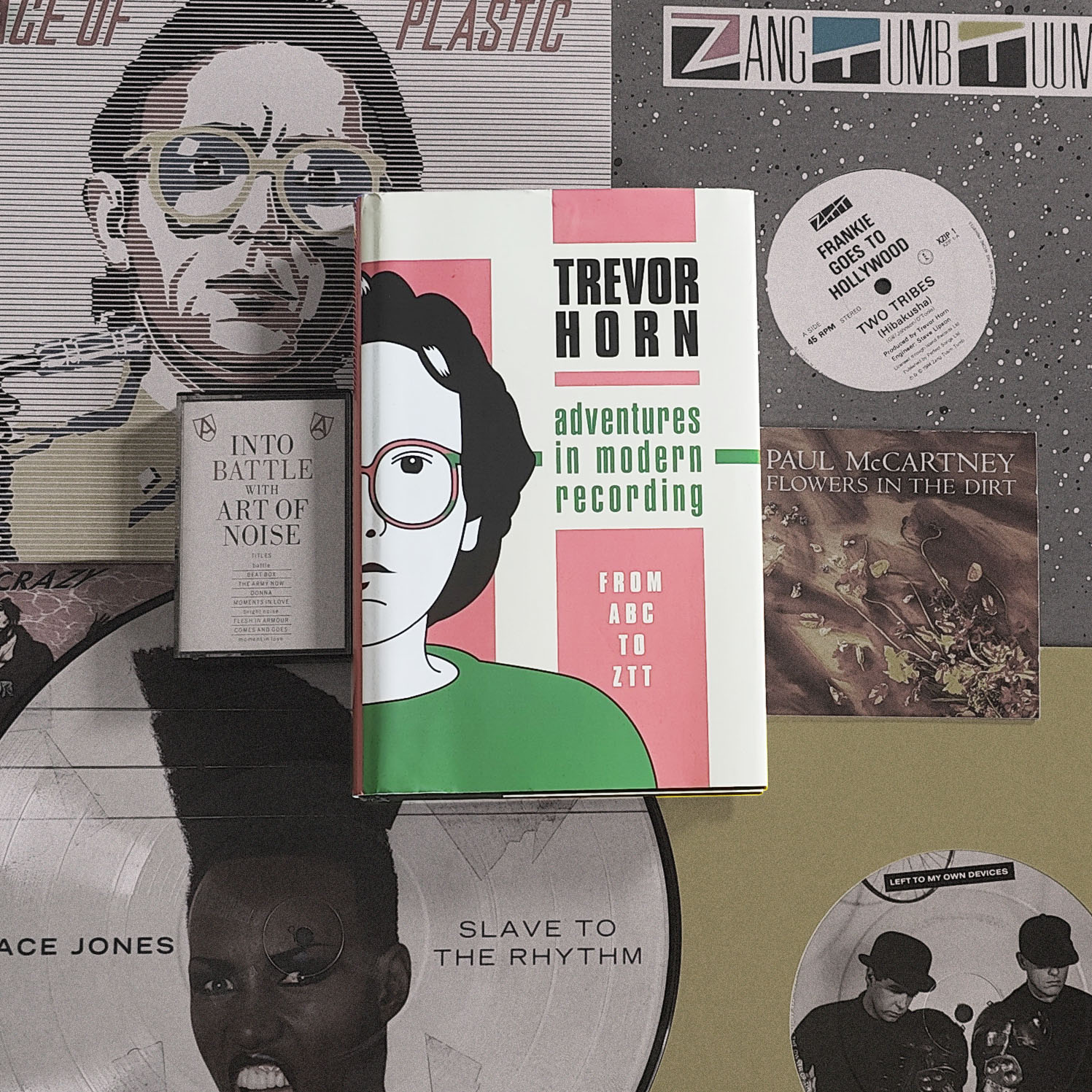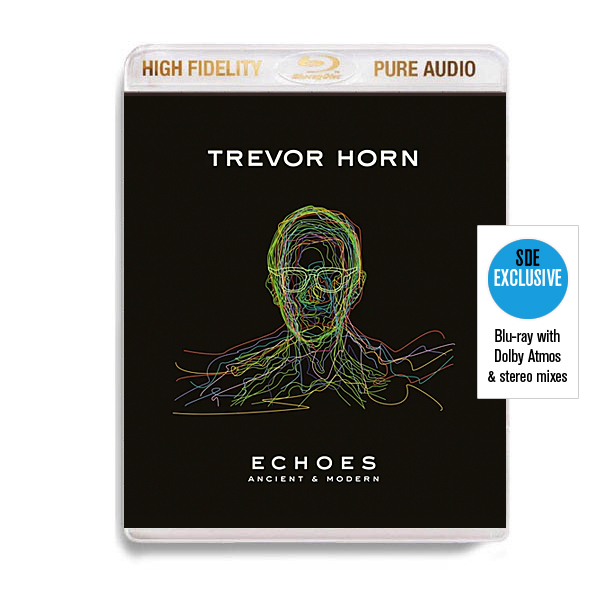Trevor Horn / Adventures in Modern Recording: From ABC to ZTT / SDE Review
Trevor’s new book, reviewed.

The working life of award winning and hit-making producer Trevor Horn – “the man who invented the 80s” – is traced through a new book in which Horn himself talks us through some of his most notable productions; songs recorded for artists like Frankie Goes To Hollywood, Paul McCartney, Seal, Grace Jones, Yes, Propaganda and many more.
Adventures in Modern Recording is an apt title for this tome, one pinched from the second (and final) album from The Buggles, the Horn-fronted band that enjoyed enormous success with the 1979 single ‘Video Killed The Radio Star’ (a song which, naturally, features in the book). Not long after this album, Jill Sinclair, Trevor’s wife and soon-to-be ZTT label manager, persuaded him to jack in this pop star malarkey and focus on where his real skills lay: producing great-sounding pop records.
Horn’s achievements are remarkable and reasonably well known to most students of 1980s music, but as the opening chapters show (this is where the book is most like a traditional autobiography) he certainly paid his dues in the 1970s as a bass-player for hire (and aspiring songwriter) with a decade of slogging around the club and dance halls circuit and doing sessions, including for those ‘Top of the Pops’ albums, which would require musicians to recreate the hits of the day for compilations that often featured scantily-clad females on the front cover (different times, etc.).
Each chapter in the book focuses on a particular artist and a specific song, and they all come with a pithy subheading to give you a flavour of each episode (ABC’s ‘Poison Arrow’: “In which I become a father and have a number one album”). Of course, it’s not just about a specific song and Horn happily goes off on tangents regularly, so the section on Paul McCartney’s ‘Rough Ride’ (almost identical to what’s in SDE’s Flowers in the Dirt booklet) spills into Trevor talking about another song they worked on with Macca called ‘Figure of Eight’ and how subsequently Trevor received an almighty bollocking from McCartney, over the phone, because he has to delay their next session by a couple of months. The reason was that he and Steve Lipson needed to finish off Simple Minds’ ‘Street Fighting Years’ (also discussed). Despite Paul McCartney’s ire (“You think I need you?”) the re-scheduled session does go ahead.
The chapter on Frankie Goes To Hollywood might be the one that many fans will skip to first (one of the appealing qualities of Adventures in Modern Recording is that it’s not necessary to read it in chronological order) and while this particular narrative is reasonably well known, and there are no truly fresh revelations per se, this writer never gets bored of hearing the stories re-told with the odd newly-minted nugget dropped in here and there. Trevor has spoken before about how guitarist Brian ‘Nasher’ Nash’s brother Ged actually played guitar on the Frankie demo tape and how that gave him a problem when the band got in the studio because (in Trevor’s opinion) Nasher “couldn’t play” at the beginning. But perhaps aware that an amusing anecdote in an interview is one thing and words on a page are another, he’s also at pains to balance this observation by pointing out that Nasher “went on to make a valuable musical contribution to the band”. Despite this, he doesn’t sit on the fence on certain matters and Trevor makes clear in the book that he blames the appearance on the scene of Holly Johnson’s boyfriend Wolfgang for Frankie’s disintegration and he acknowledges that it was a ultimately a “stupid decision” for ZTT to take legal action against Johnson.
You Might Like
Speaking of which, a theme common to the ZTT-era artists is feeling aggrieved about their treatment and Trevor, in turn, feeling as if there’s an unbelievable lack of gratitude by musicians who, in his eyes, would never have enjoyed the success they did without his production team and the ZTT umbrella. Trevor Horn is particularly scathing about Michael Mertens from Propaganda in this regard. He recalls bumping into Mertens after he’d left the label (taking the name Propaganda with him) to sign with Virgin and telling him “You walked away from us after we did everything and you’ve fucked it up and pissed it down the drain”. He’s a bit more magnanimous with the Art of Noise when they want to leave, probably because the likes of Gary Langan, J.J. Jeczalik and Anne Dudley had all been trusted allies and important contributors to many, many albums he’d worked on. He lets them walk away and gives them the name ‘Art of Noise’, even though ZTT owned it (“much to Jill’s disgust”).
The trials and tribulations of Horn working with ex-Sex Pistols manager Malcolm McLaren on what would turn out to be the 1983 Duck Rock album is as hilarious as it is eye-opening. Horn and McLaren, in cahoots with engineer Gary Langan, follow their muse and their noses, travelling the world (New York, South Africa, London) searching for inspiration and soaking up sounds, influences, rhythms. Trevor writes warmly of McLaren and appears to have had a remarkable amount of patience with the man’s musical curiosity and his unconventional schemes and exploits. Malcolm certainly had a penchant for spending other people’s money (Charisma were on the hook for over 200k of expenses) although they weren’t stingy either and paid a group of Soweto musicians £1000 each for a couple of week’s work (“an absolute fortune” say Horn, for these players who were “used to recording a whole album in an afternoon and getting £4.50 for it”). What’s remarkable is that despite McLaren having “no sense of pitch or rhythm” Horn comes up with a way to fashion two UK hit singles (‘Buffalo Gals’ and ‘Double Dutch’) from these chaotic-sounding sessions and the Duck Rock album, although all but forgotten, in terms of the mainstream (it has never been reissued), remains very influential.
There’s not too much in the way of soul searching in Adventures in Modern Recording, although Horn admits he was “ruthless” with ABC, talking them into getting rid of Mark Lickley, their bass player, while recording 1982’s The Lexicon of Love (he lacked the required ’finger-style’ ability, in Trevor’s view). He was also unhappy with keyboard player Tony Kaye’s contributions to what would become Yes’ 90125 album, and walked out, telling the band “I’m not coming back until Tony’s off the session”. Also, while he’s justifiable proud of Frankie Goes To Hollywood’s ‘Relax’, he acknowledges that “it was a mistake on my part” to not find a way to have the whole band playing on that single. Trevor doesn’t try to excuse his decisions or behaviour and it’s left for the reader to decide whether he’s a bit of a bastard or someone just obsessed with ‘getting it right’, striving for aural perfection and making the best sounding record he can.
It’s hard not to warm to Horn who is an engaging storyteller and comes across as a reliable witness in his battles with bands, record labels and dealing with the random forces of chaos that descend when albums are made. He has a wonderful recall for details and isn’t scared to get into the technicalities, including informing us of the type of compressor used on Seal’s ‘Crazy’ to help balance the vocals and instrumentation after ZTT label manager Jill Sinclair complained about her new signing: “I’ve [not] paid all this money to hear your fucking backing track. He needs to be louder”. The Seal section of the book is very interesting, with Trevor following the journey of the song as the production moves from co-writer Guy Sigsworth to Tim Simenon (who contributed that big drum break in the middle) to Trevor himself. He spent an enormous amount of time on this one track which was justified in the end when it became a transatlantic top ten single.
The big budgets, the bad behaviour (Horn has to be physically restrained from punching Yes’ Chris Squire in the face at one point), the jet-setting (Concorde is mentioned more than once) and the enormous amounts of time spend in lavish studios, are now largely a product of a bygone age, so the ‘modern’ in the title is something of a misnomer, or perhaps said with a tongue firmly in cheek. However the music endures and these accounts of the sessions that created that music – Trevor blowing his own horn – are both as entertaining and as enlightening as you would hope for. Highly recommended.
Trevor Horn’s Adventures in Modern Recording: From ABC to ZTT is published on 13 October 2022 via Nine Eight Books.
Compare prices and pre-order

Horn, Trevor
Adventures in Modern Recording: From ABC to ZTT

|
|
||||||||||||||||||||||||||||||||||||||||||

 Reviews
Reviews Interview
Interview


By Paul Sinclair
76